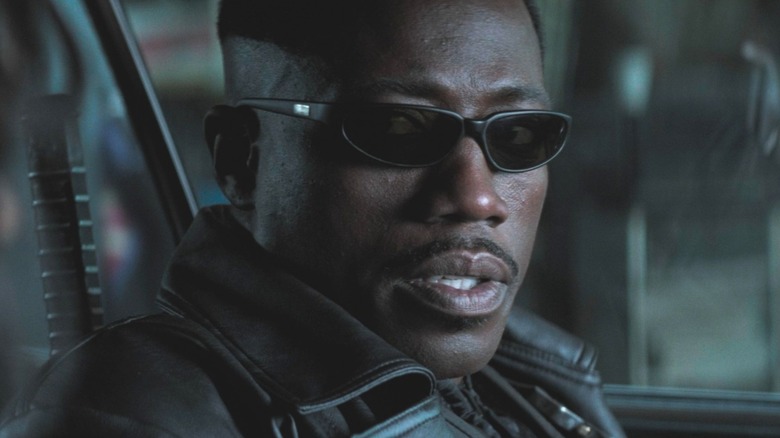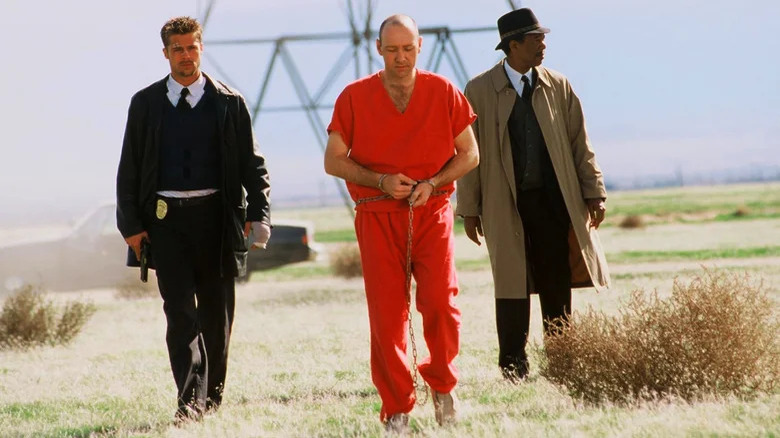David Fincher Could've Made Blade In The '90s, But He Made Another Classic Instead
Oh, the annals of movies that were made by one guy who is kind of cool that were almost made by another guy who is way cooler. Did you know John Frankenheimer almost directed "Breakfast at Tiffany's?" That would have been ... intense. What about the fact that Danny Boyle almost directed Joss Whedon's script for "Alien: Resurrection?" Or that David Lynch, on the heels of the movie he went on to hate having made, "Dune," almost made "Return of the Jedi" instead?
How we love to imagine singular, iconic visions through the looking glass, remade in vastly different, yet just as distinct styles. One of the banner entries in this almost-Hall of Fame is the "Blade" movie that David Fincher almost made. It was the early-to-mid-90s. Bill Clinton had just been elected President. Whitney Houston's "I Will Always Love You" could be heard booming through every speaker dialed to every radio station in America. And David Fincher, fresh off the heels of directing the brilliant but notoriously difficult "Alien³," was looking for his next project. His sophomore feature, 1995's "Se7en," established him as a major Hollywood auteur almost instantaneously. But he could have had a very different career if a proto-MCU deal had worked in his favor.
It's been known for some time that Fincher was attached early on to New Line Cinema's effort to bring Marvel Comics' anti-heroic vampire hunter Blade to the big screen. But in a new interview on the "Happy Sad Confused" podcast, the "Blade" franchise's screenwriter, David S. Goyer (who also directed the threequel, "Blade: Trinity"), revealed just how committed Fincher was at one time to his own meticulous vision of Blade.
'This is the movie'
Like Fincher, David S. Goyer has gone on to have a fabulous and rewarding Hollywood career, working with Christopher Nolan on The Dark Knight Trilogy, penning cult classics like "The Crow: City of Angels" and "Demonic Toys," and being one of the only voices of reason behind the scenes of DC's doomed arc of Henry Cavill Superman movies (which he had plenty to say about on "Happy Sad Confused" — very little of it good).
Goyer reflected fondly on his brief time working with Fincher in the boom days of New Line Cinema in the early '90s:
"I developed a draft with Fincher before he had done 'Se7en.' [...] I remember going to our producer's office ... There was this giant conference table. Fincher laid out 40 to 50 books of photography and art with post-it notes inside them. He said, 'This is the movie.'"
It's unclear whether or not Fincher was already in pre-production on "Se7en" at the time, but Fincher has revealed that he'd been aware of the script for the film floating around Hollywood for years by that point. In either case, Goyer's recollection of Fincher aligns exactly with the exacting, comprehensive intellect of legend that makes his movies shine:
"[Fincher] took us on a two-hour tour around the table of the aesthetics of this scene, that character. [...] It was such a fully fleshed-out visual pitch ... I had never seen something like that before. A lot of that thinking infused my further revisions."
Fincher would eventually be replaced by Stephen Norrington, who turned "Blade" into a modest box office hit with long cultural legs. And Fincher, well, we know how it turned out for him.

